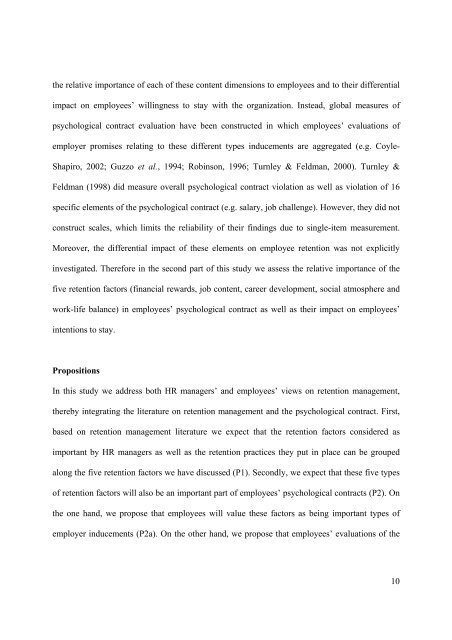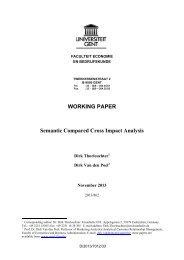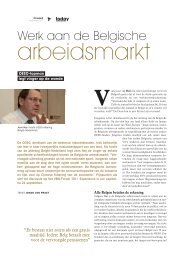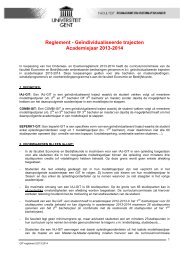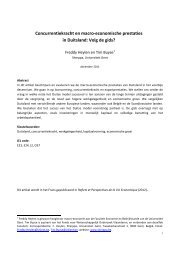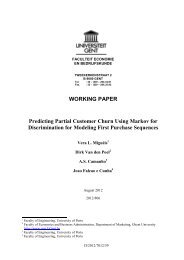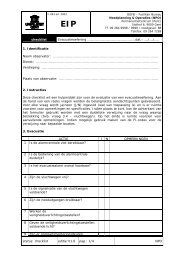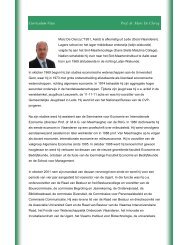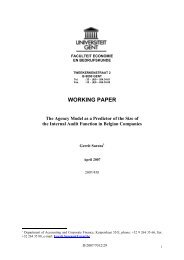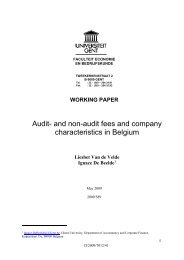WORKING PAPER - Faculteit Economie en Bedrijfskunde
WORKING PAPER - Faculteit Economie en Bedrijfskunde
WORKING PAPER - Faculteit Economie en Bedrijfskunde
You also want an ePaper? Increase the reach of your titles
YUMPU automatically turns print PDFs into web optimized ePapers that Google loves.
the relative importance of each of these cont<strong>en</strong>t dim<strong>en</strong>sions to employees and to their differ<strong>en</strong>tial<br />
impact on employees’ willingness to stay with the organization. Instead, global measures of<br />
psychological contract evaluation have be<strong>en</strong> constructed in which employees’ evaluations of<br />
employer promises relating to these differ<strong>en</strong>t types inducem<strong>en</strong>ts are aggregated (e.g. Coyle-<br />
Shapiro, 2002; Guzzo et al., 1994; Robinson, 1996; Turnley & Feldman, 2000). Turnley &<br />
Feldman (1998) did measure overall psychological contract violation as well as violation of 16<br />
specific elem<strong>en</strong>ts of the psychological contract (e.g. salary, job chall<strong>en</strong>ge). However, they did not<br />
construct scales, which limits the reliability of their findings due to single-item measurem<strong>en</strong>t.<br />
Moreover, the differ<strong>en</strong>tial impact of these elem<strong>en</strong>ts on employee ret<strong>en</strong>tion was not explicitly<br />
investigated. Therefore in the second part of this study we assess the relative importance of the<br />
five ret<strong>en</strong>tion factors (financial rewards, job cont<strong>en</strong>t, career developm<strong>en</strong>t, social atmosphere and<br />
work-life balance) in employees’ psychological contract as well as their impact on employees’<br />
int<strong>en</strong>tions to stay.<br />
Propositions<br />
In this study we address both HR managers’ and employees’ views on ret<strong>en</strong>tion managem<strong>en</strong>t,<br />
thereby integrating the literature on ret<strong>en</strong>tion managem<strong>en</strong>t and the psychological contract. First,<br />
based on ret<strong>en</strong>tion managem<strong>en</strong>t literature we expect that the ret<strong>en</strong>tion factors considered as<br />
important by HR managers as well as the ret<strong>en</strong>tion practices they put in place can be grouped<br />
along the five ret<strong>en</strong>tion factors we have discussed (P1). Secondly, we expect that these five types<br />
of ret<strong>en</strong>tion factors will also be an important part of employees’ psychological contracts (P2). On<br />
the one hand, we propose that employees will value these factors as being important types of<br />
employer inducem<strong>en</strong>ts (P2a). On the other hand, we propose that employees’ evaluations of the<br />
10


